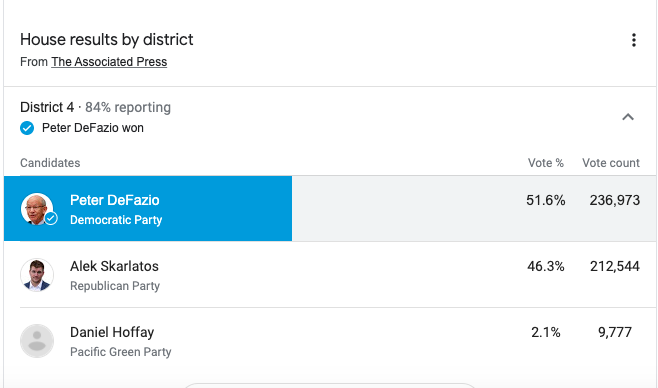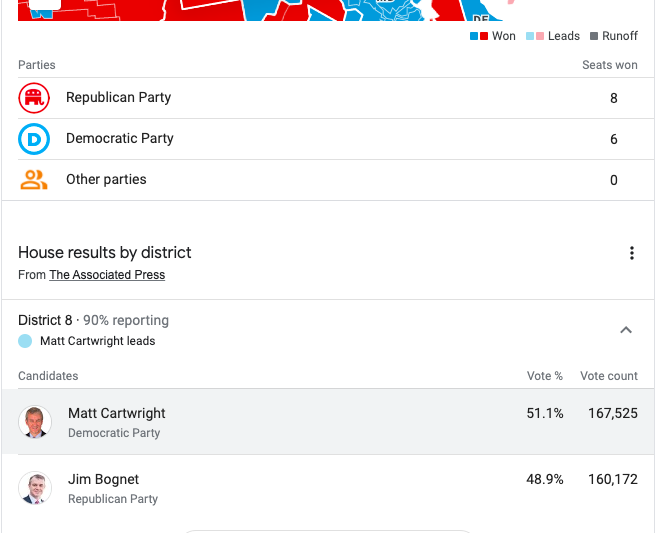House Dems who lost reelection in 2020:
- Donna Shalala, an opponent of Medicare for All and defunding the police.
- Joe Cunningham, an opponent of Medicare for All and defunding the police.
- Xochitl Torres Small, an opponent of Medicare for All and defunding the police.
(1/2) https://twitter.com/JakeSherman/status/1324456569778675712">https://twitter.com/JakeSherm...
- Donna Shalala, an opponent of Medicare for All and defunding the police.
- Joe Cunningham, an opponent of Medicare for All and defunding the police.
- Xochitl Torres Small, an opponent of Medicare for All and defunding the police.
(1/2) https://twitter.com/JakeSherman/status/1324456569778675712">https://twitter.com/JakeSherm...
- Abby Finkenauer, an opponent of Medicare for All and defunding the police.
- Kendra Horn, an opponent of Medicare for All and defunding the police.
- Collin Peterson, an opponent of Medicare for All and defunding the police.
- Kendra Horn, an opponent of Medicare for All and defunding the police.
- Collin Peterson, an opponent of Medicare for All and defunding the police.
- Joe Cunningham, an opponent of Medicare for All and defunding the police.
- Debbie Murcasel Powell, who once spoke in favor of Medicare for All but abandoned support for the issue, and also an opponent of defunding the police.
- Debbie Murcasel Powell, who once spoke in favor of Medicare for All but abandoned support for the issue, and also an opponent of defunding the police.
Sorry, you can& #39;t have it both ways. These Democrats publicly opposed Medicare for All and defunding the police and lost.
Whoops, forgot Max Rose, who ran hard to the right on matters of policing, disparaged his progressive colleagues (Ocasio-Cortez and Omar in particular), and was still called a "cop hater" and lost.
In the interest of clarity (i.e. a pretentious way of seeing "to be clear"): The worst Democrat is better than the best Republican, and I cast my ballot for Gil Cisneros this year, a terrible Democratic member of Congress who reneged on his campaign promise to support MFA.
I also personally voted for Biden and convinced friends in swing states to vote for him in case anyone wants to accuse me of insufficient loyalty to the party or whatever.
The fact of the matter is that the conservative elements of the Democratic Party want to use the disappointing downballot results this cycle to push Dem. candidates to abandon support for Black Lives Matter and healthcare for all. We can& #39;t stand by and let this happen.
We& #39;ll be able to conduct a more accurate diagnosis of what went wrong this cycle when every vote is in but the fact of the matter is that support for Medicare for All/police defunding did not cause the party to lose House seats.
Let& #39;s talk about how some of the progressive incumbents running in swing districts did, shall we?
Peter DeFazio is a legendary progressive who supports the Green New Deal and Medicare for All. In 2016, Clinton only won his swing district by 0.1% of the vote.
He faced a star GOP recruit this time around, and guess what? His progressive vision resonated and he won reelection.
He faced a star GOP recruit this time around, and guess what? His progressive vision resonated and he won reelection.
Katie Porter is a supporter of Medicare for All and one of the fiercest opponents of corporate power in D.C. She flipped a historically conservative seat by running on a progressive platform in 2018.
In 2020? Republicans didn& #39;t even *try* to beat her. They knew they couldn& #39;t.
In 2020? Republicans didn& #39;t even *try* to beat her. They knew they couldn& #39;t.
Mike Levin is a supporter of Medicare for All and the Green New Deal who ran for Congress in 2018 in an R+1 seat held by longtime Republican Darrell Issa.
Guess what? He won then, and the GOP barely put up a fight against the progressive incumbent in his swing district.
Guess what? He won then, and the GOP barely put up a fight against the progressive incumbent in his swing district.
While Matt Cartwright may not be as progressive as Katie Porter, Congressman Cartwright is a strong supporter of Medicare for All/single-payer healthcare and won reelection in remarkably tough territory on Tuesday. Medicare for All can clearly win in swing districts.
Damn, this thread blew up, read @LabyrinthPol https://www.labyrinthmag.org/post/a-wash-in-the-bay-state">https://www.labyrinthmag.org/post/a-wa...
Anyway, I& #39;ll conclude this thread (which I did not envision being as long as it came out to be!) by saying that I& #39;m not commenting about the subject of whether the relevant issues are electorally advantageous or not.
What I do object to, however, is Dem. leadership using the disappointing down-ballot results as an argument against taking single-payer healthcare as a policy plank.
When moderate Dems. running in swing districts performed well in 2018, we were told that it was a vindication of centrist strategy and proof that the Left theory of change is futile.
This year, in response to the failure of moderates like Shalala to secure reelection, we& #39;re being sold the notion that this is, too, a vindication of centrist strategy and proof that the Left theory of change is futile.
Political narratives are never particularly honest. Opponents of single-payer healthcare have a vested interest in spinning election results as a vindication of their worldview, and while they have every "right" to do so, neither you nor I are under any obligation to accept it.
The fact of the matter is that there were progressive incumbents running in swing districts (Levin/Porter/DeFazio) who won and there were centrist incumbents running in swing districts (Casten/Axne/Slotkin) who also won.
Additionally, there were moderate candidates for competitive seats, either challengers (Kulkarni/Jones/Davis) or incumbents (Shalala/Rose/Torres), who lost, just as there were progressive candidates in swing districts (Siegel/Eastman/Valenzuela) who lost.
Democrats do clearly have an image problem and need to expand their base of support. But the fact is that Biden did not support Medicare for All during his campaign, the relevant losing incumbents did not support Medicare for All, and Medicare for All continues to poll well.
We can argue about what path the party should take going forward. If one of these arguments rests upon the notion that *Medicare for All* of all proposals can be explained as the reason for losses on Tuesday, however, it& #39;s more likely than not being made in bad faith.

 Read on Twitter
Read on Twitter





